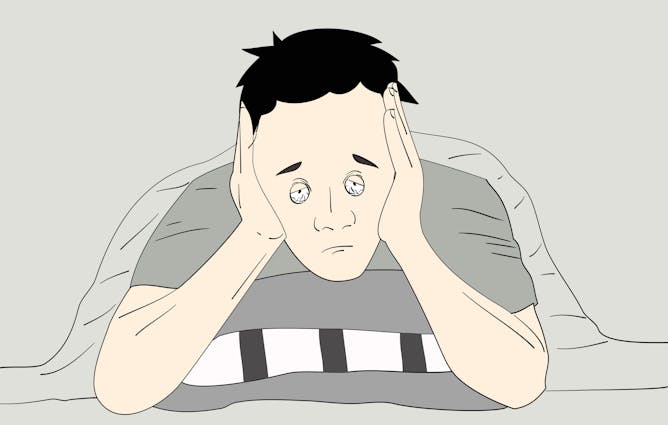|
One in three people experience insomnia at some point in their life. Women and older people are more often affected by chronic sleeplessness, which can last for years. Insomnia is a major risk factor for our wellbeing, yet still very little is known about why and how a prolonged absence of sleep gives rise to mental illness.
In our latest Insights long read, researchers at the University of York explain what might be going on. Their pioneering work explores how sleep deprivation disrupts the brain’s ability to suppress intrusive memories and distressing thoughts. It’s a horrible catch-22: anxiety arising from these thoughts can obstruct the sleep that is needed for recovery, leading to a vicious cycle of emotional dysregulation and sleeplessness. But their research is also suggesting new ways to treat insomnia and other mental illness – by playing sounds to people while they sleep.
Shipping disruption caused by the attacks on merchant vessels in the Red Sea has sparked fears in the UK of a national tea shortage (gulp). An expert in global supply chains predicts what other types of product might be at risk.
And we explain how a blow to the heart can kill you – or bring you back to life.

|

|
Mike Herd
Investigations Editor, Insights
|
|

APIMerah/Shutterstock
Scott Cairney, University of York; Aidan Horner, University of York
We envisage a future in which sleep is a routine target for reducing or preventing symptoms of mental illness, both in psychiatric settings and people’s homes
|

Stockah/Shutterstock
Jas Kalra, Manchester Metropolitan University
Tea supplies are under threat as a shipping crisis continues in the Red Sea.
|

xian-photos/Shutterstock
Dan Baumgardt, University of Bristol
Some claim that Alexei Navalny was killed by a single blow to the heart. But is this feasible?
|
Politics + Society
|
-
Stephen Hall, University of Bath
Most of Vladimir Putin’s opponents are either dead, in jail or in exile. But it might just be ordinary people who can take over the battle for democracy in Russia.
-
Helen Carr, University of Southampton; Carin Tunåker, University of Kent
The number of people sleeping rough in rural areas has increased by 24% in the last year.
-
Leighton Andrews, Cardiff University
There is no manual for a job at the top of government but a few golden rules are largely agreed upon by those who have experienced ministerial life.
-
Luke Brunning, University of Leeds
Relationship anarchists argue that we should relate to one another as equals and accept that intimacy can take many forms.
-
Shan-Jan Sarah Liu, The University of Edinburgh; Li-Yin Liu, University of Dayton
Taiwan’s presidential candidates failed to address women’s interests and resonate with women voters.
-
Alexander Hinton, Rutgers University - Newark
While Ronald Reagan is closely tied to this conservative conference’s origins, it has become a multiday event for die-hard Trump supporters.
|
|
Arts + Culture
|
-
Briony Hannell, University of Sheffield
Since its conception in 2007, Tumblr has developed a reputation for its appeal to marginalised users.
-
Sally O'Reilly, The Open University
If you fell in love with Dexter and Emma you are sure to do the same with the characters in these funny and moving tales of love.
-
Rosie Everett, University College Cork; Benjamin Gearey, University College Cork; Karl Harrison, Cranfield University
The bog does not neatly divide traces of the distant and recent past. Archaeology and forensic science still have much to learn from each other.
|
|
Business + Economy
|
-
Ru Xie, University of Bath
The Ides of March will coincide with one or two changes to the financial system that could cause problems for banks and the economy.
|
|
Cities
|
-
Harry Bennett, University of Plymouth
Recent events in Keyham, Plymouth, are a reminder that every year unexploded second world war-era ordinance is still found in British cities.
|
|
Environment
|
-
Oscar Rueda, Leiden University; Laura Scherer, Leiden University
‘Beccs’ faces lots of problems. A global switch away from meat could help address them.
|
|
Health
|
-
Ian Mills, University of Plymouth
New government proposals include scrapping the exam that overseas dentists usually have to take.
|
|
Science + Technology
|
-
Ian Whittaker, Nottingham Trent University
The mission provided details about how to deflect an asteroid should one threaten Earth in future.
|
|
|
|
| |
|
|
7 - 8 March 2024
•
Dublin
|

|
|
|

|
21 March 2024
•
Walton Hall
|

|
26 - 27 March 2024
•
Southampton
|

|
|
|
|
| |
| |
| |
| |
| |
|
|